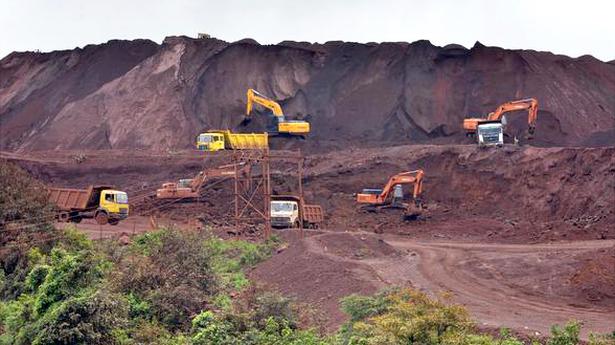
Karnataka iron ore mining | Why has the Supreme Court relaxed a decade-old ban?
The Hindu
Ten years after it clamped down on illegal iron ore mining in Karnataka, why has the Supreme Court relaxed its orders on production and sale of iron ore in the state?
The story so far: On August 26, 2022, the Supreme Court raised the ceiling limit of iron ore mining for Ballari (from 28 MMT to 35 MMT), Chitradurga and Tumakuru districts (from 7 MMT to 15 MMT collectively) in Karnataka, saying conservation of the ecology and environment must go hand in hand with the spirit of economic development.
Earlier, on May 20, 2022, the apex court had relaxed the ban on sale outside the state and export of already excavated iron ore from mines in these three districts. It also allowed mine lessees to enter into direct contracts, without taking recourse to electronic auctions.
Ten years after it clamped down on production and sale of iron ore in Karnataka, why has the Court relaxed its own orders? What does this mean for mining operations in the state?
Karnataka’s mining story is closely linked to the notorious Reddy brothers of Ballari. In 2002, Gali Janardhan Reddy incorporated the Obulapuram Mining Company (OMC) in Andhra Pradesh’s Anantapur district. Eight years later, in 2010, it was shut down by the Supreme Court, after a Central Bureau of Investigation (CBI) probe was initiated against Reddy in 2009 for illegal mining. The unprecedented illegal mining left in its wake a plunder of public wealth, massive losses to the exchequer, encroached forest land, a ravaged environment and large-scale health issues among the local population.
The two Lokayukta Reports of 2008 and 2011 exposed over 700 government officials, including three chief ministers in the illegal mining scandal laying bare the nexus between the political class and the mining and steel industries. The second report led to the resignation of BJP leader B S Yediyurappa. After the Supreme Court-appointed Central Empowered Committee (CEC) report brought to light accounts of rampant violations in mining, the apex court passed an order on September 23, 2011 to stop mining operations in Ballari.
Furthermore, the SC banned export of iron ore pellets from Karnataka with an aim to prevent environmental degradation and to ensure that the mineral resources of the state are preserved for future generations as part of the concept of inter-generational equity. It then fixed maximum permissible annual production limit at 35 MMT for A and B category mines.
After it banned mining in Ballari in 2011, the Supreme Court directed the Indian Council of Forestry Research and Education (ICFRE) to draw up a reclamation and rehabilitation (R&R) plan to reverse the environmental damage caused by illegal mining. It also directed the state government to undertake the creation of core zones and buffer zones for the protection of “ancient monuments”.













